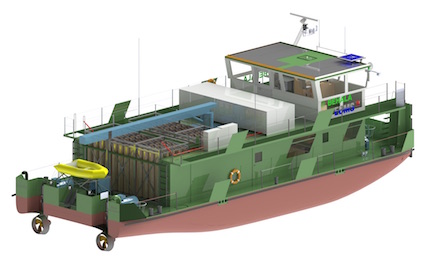(SPAY, Germany) — The innovative Elektra pushboat, ordered by Berlin harbor’s warehousing and logistics firm Behala and developed at the Department of Design and Operation of Maritime Systems at the Technical University of Berlin, will be equipped with rudderpropellers from Schottel. The hybrid canal pushboat is powered by a combination of fuel cells, batteries and an electric motor. Elektra, which is currently under construction at the Hermann Barthel shipyard in Derben (Germany), will be the first emission-free pushboat worldwide.
The 65-foot pushboat will be equipped with two Schottel rudderpropellers type SRP 100 with nozzle (200 kW each) and a Schottel steering and control system. The minimum service speed is 10 km/h and a maximum thrust load of 1,400 tonnes is available.
The vessel will use fuel cell technology for the basic energy supply of the power train and for the shipboard electrical system. At peak loads, additional energy is provided by the batteries. The hydrogen supplied to the fuel cell is generated via electrolysis from green electricity generated by wind power.
It is planned that Elektra will first be tested in Berlin in 2020 and, starting in 2022, between Berlin and Hamburg as well. From 2025 onward, the vessel is to travel in commercial operation between Berlin and Hamburg and to be used primarily for freight transport. From its first day of testing in Berlin, Elektra will be completely emission and pollutant-free.

